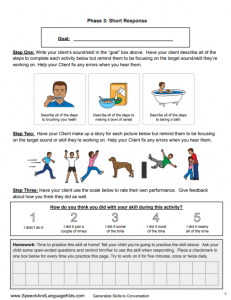Speech Therapy Carry-Over and Generalization for Articulation
We’re talking ARTICULATION CARRY-OVER! Do you have any students who can say their speech sounds perfectly in the speech room but seem to lose them as soon as they walk out of your room? So frustrating! Carissa from Home Sweet Speech Room and I share our best tips and tricks for articulation carry-over.
Below are the links to the products that were talked about in the Speechie show:
- Home Sweet Speech Room Site: http://homesweetspeechroom.blogspot.com/
- Carissa Speelman’s Teachers Pay Teachers Store: https://www.teacherspayteachers.com/Store/Carissa-Ten-Hoeve-Speelman
- Sound Posters: https://www.teacherspayteachers.com/Product/Speech-Sounds-by-Letter-Posters-1955455
- Evidence-Based Practice Reference: https://www.teacherspayteachers.com/Product/Evidence-Based-Practice-Quick-Reference-Speech-Language-Pathology-806606
If you’d rather listen to the audio version of the Speechie Show, click here:
Or if you prefer to read the transcript, see below:
Welcome to the Speechie Show! Being a speech language pathologist often means having too much work and not enough planning time. To beat the overwhelm, we’re bringing you the tricks and tools that will make your job a little bit easier.
Carrie: Hey everybody welcome to the Speechie Show. Today we are talking about articulation carry-over and I’m here with Carissa Speelman from Home Sweet Speech Room. How are you today Carissa?
Carissa: Good, how are you?
Carrie: Doing well. We’re excited to be here. Hopefully if you are on here, if you are watching on Facebook Live with us right now, you are able to hear and see us. If you’re having any technical problems, please let us know. We’ve had some in the past and we didn’t know about them. So, having technical problems comment in. But, we are here today and talking about what to do when you have students who are doing their speech sounds really well in the speech room and then as soon as you get them back to the classroom, it’s like they forget everything and they don’t know how to generalize that to the classroom. So, if you know somebody else who is interested in this topic, go ahead and share this on Facebook and let’s get some more viewers on here and while we are getting started, go ahead and type in what is the hardest sound that you’ve come across for kids to generalize. So, which sound are kids having the hardest time with? If you’re new to the show, I’m Carrie Clark. I run speechandlanguagekids.com. And this is the Speechie Show. We do this every week. We interview a speech language pathologist and we give 5 tips on whatever topic we want to talk about that week. So, this week is articulation carry-over with Carissa. Carissa why don’t you go ahead and tell us a little bit about yourself.
Carissa: I’m Carissa Speelman like Carrie mentioned and I’m an author at home speech room. I’ve been blogging there for a little over 4 years. I started it in graduate school to have something to do. I have supervisors tell me that they like planning activities so I thought I would share them with the world. I started my career in the school setting. So, I worked with the schools for two full school years. And this past May I just transitioned to an outpatient pediatric clinic and am loving it.
Carrie: That’s fantastic, yeah. I really enjoyed the switch from schools to the private practice. But it’s nice to have that experience in the schools too, to really understand what that looks like in the school. Because a lot of our kids are doing school therapy and outside therapy.
Carissa: And it’s allowed me to give advice to parents too and kind of talk through the differences and if they’re having trouble with something at school like an IEP or something, you know give advice for both.
Carrie: Sure, sure absolutely. Wonderful. Alright welcome everyone who’s watching. Heather says vocalic R is the hardest one to generalize. Definitely. If you are watching with us go ahead and comment in what are the hardest sounds for your students to generalize. And don’t forget to share this on Facebook so we can get some more people on here. Ok also, stay tuned if you’re watching live with us today. We are doing some giveaways here in a little bit. We have 3 giveaways today so stay tuned. But were going to jump right in and talk about 5 points to help improve articulation carry over. So, the first one we want to talk about is reminders on the student’s desk. Carissa, talk to us about the kinds of reminders that you recommend.
Carissa: Sure, so I’m going to preview a product that we’re going to give away too, but I like to use my speech sound by letters posters. These are big. These are about half of an 8 1/2 X 11 sheet. And I like to scale them down a little bit. So, they’ve got the visual with the mouth. How their mouth is supposed to look. And here’s a couple of different ones. Um they’re great cards to show what the mouth is supposed to be doing. As their teachers or if I pop in randomly I can just point to those. I put a little card on their desk um and just that little quick reminder so if their teacher is walking by and hear them say that r wrong or that th wrong um they can just point to it and it’s a quick visual that doesn’t point out to other kids in the room really. Just kind of like a private little reminder.
Carrie: Perfect.
Carissa: It may sound crazy but it works.
Carrie: Yeah sometimes they just need that little bit of extra visual to be like oh yeah, I’m supposed to be thinking about this sound. Definitely. Alright, Annie says R, S, L, and TH. She’s got all the big ones up there. Those are the ones that are hard for Annie’s students to generalize for sure. I think we all struggle with those.
Carissa: Especially when they have L and R.
Carrie: YES. Yeah and then you try to throw in a word like world, that’s got both of them and you’re just…it’s gone, totally gone. Alright, if you are watching with us live and you have any questions as we go along, please feel free to add those into the comments and we’ll answer those as we go. Alright, so we talked about reminders on the desk. Our 2nd point for …our 2nd tip for articulation carry over is incentives for homework. Tell me about that Carissa.
Carissa: So when I was in the school setting I used like a money system, instead of just prizes. So, every time they brought in a signed homework packet with their parents initials on it, I would give them a dollar, a fake dollar, and once they had 10 or 20, they had different things that they could save up for. So, it was motivating for them…—>click here to read the full transcript.

About the Author: Carrie Clark, MA CCC-SLP
Hi, I’m Carrie! I’m a speech-language pathologist from Columbia, Missouri, USA. I’ve worked with children and teenagers of all ages in schools, preschools, and even my own private practice. I love digging through the research on speech and language topics and breaking it down into step-by-step plans for my followers.
Fun Fact: When my son was three, he once got mad at me and told me he was going to send me to Antarctica in nothing but a t-shirt. He had an overly large vocabulary for a 3-year-old….along with an overly large amount of sass. He still has both to this day.
Connect with Me:







Leave A Comment